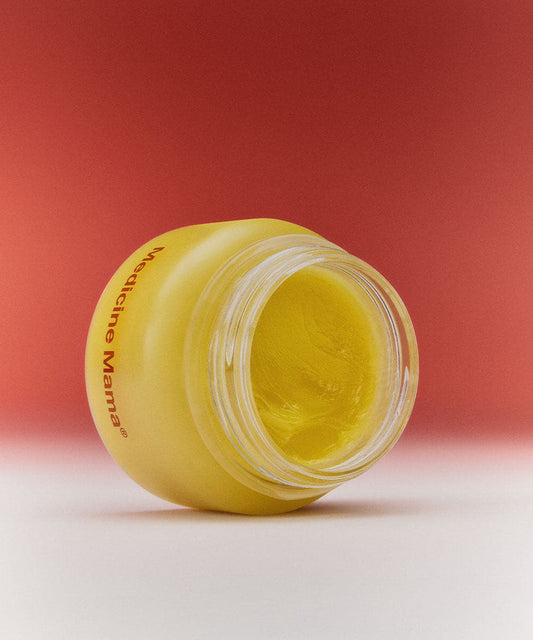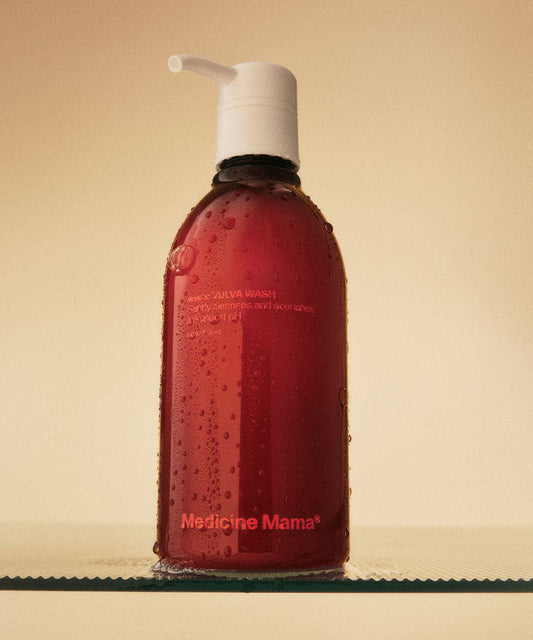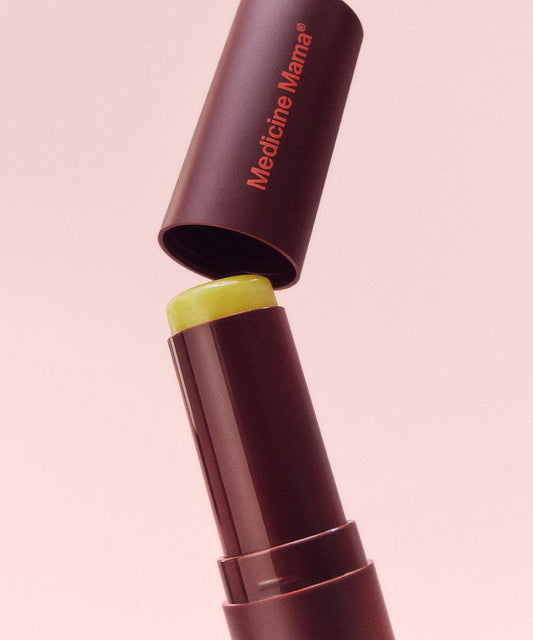
Reviewed by | Melinda (Melle) Hany, RN, ADN Registered Nurse
Let’s be honest: painful sex during menopause isn’t exactly a dinner table topic. But it’s real, it’s common, and it can seriously mess with your confidence, relationships, and quality of life.
At Medicine Mama, we talk to women who are dealing with this and wonder if it’s just them all the time. Spoiler: it’s not.
Here’s what’s actually going on, what it can feel like, and how to start feeling like yourself again — yes, even in bed.
Why Can Menopause Make Sex Physically Uncomfortable?
When estrogen levels start to dip during menopause, many things begin to shift. That hormonal drop affects the tissue around your vagina and vulva in ways that are hard to ignore once they show up. The skin gets thinner, less stretchy, and drier, which often means less cushion, less comfort, and more friction (and not in a good way).
Lower estrogen also means less blood flow to the area, which directly impacts arousal. You might still feel in the mood mentally, but physically, your body’s not producing the same level of natural lubrication it used to. So, even if everything else is working — emotionally, connection-wise, etc. — the tissue itself might not be ready, and that can lead to discomfort.
What Does Discomfort During Sex Actually Feel Like?
There’s no one version of this. For some, it’s a dry, papery sting right at the opening. For others, it’s a deeper ache that only shows up after the fact. You might feel raw, itchy, tight, or just vaguely uncomfortable in a way you can’t quite explain.
Sometimes, the discomfort is sharp and sudden. Sometimes, it creeps in slowly. Maybe it’s only during penetration, maybe it lingers after. Either way, it can be disruptive and frustrating, especially if no one ever warned you this could happen.
Just to be clear: uncomfortable sex doesn’t mean you’re broken. It doesn’t mean you’ve lost something essential or that this is “just part of aging” you have to accept. It means your body is adjusting and needs something different to feel good again. That’s totally normal, and it’s something you can do something about.
So, What Are Some Tips for Managing Discomfort During Sex?
There’s a lot you can do, and no, it doesn’t mean overhauling your whole life. These small shifts can help rebuild comfort and make intimacy feel good again.
Here are some of the best places to start:
Rebuild Moisture (Daily)
If things feel dry only during sex, chances are they’re actually dry all the time; it’s just more noticeable in the moment. That’s why a daily routine makes a difference. Moisture needs to be maintained.
A hormone-free vulva moisturizer can help keep the tissue soft, soothed, and ready, not just for sex, but for everything else, too (walking, sitting, wiping, you name it). Our VMAGIC® Vulva Balm is made with organic ingredients and no added fragrance, so it’s gentle enough for daily use. Just swipe a little on after a shower or before bed and let it do its thing in the background.
Use a Lubricant That Actually Works With You
A good lube is necessary. But not all lubricants are created equally, especially when your skin is more reactive than it used to be. Anything that’s too thick, full of fragrance, or made with harsh ingredients can make things worse. “Certain formulations, like silicone or oil-based, can also have their own set of side effects,” notes Melinda Hany, Registered Nurse.
Look for a water-based lube that’s gentle, non-irritating, and actually designed for sensitive skin. Our Intimate Glide is made with organic aloe to help supplement your body’s natural moisture without throwing off your balance. It works with your skin, not against it.
Go Slow + Rethink Foreplay
Here’s something no one says enough: you’re allowed to slow down. Especially during and after menopause, your body might need more time to feel comfortable, and that’s not a problem.
Foreplay isn’t just about building excitement. It physically helps your body prepare. More time and attention means more blood flow, more natural lubrication, and more comfort overall. Rushing through it (or skipping it entirely) can leave you feeling tense, dry, and nowhere near ready.
Try communicating what feels good and what doesn’t, and don’t be afraid to press pause if things start to feel off. Your comfort deserves to come first always.
Check In With Your Partner
If you’ve been gritting your teeth through sex, your partner might not even know it’s happening. And no, that doesn’t mean they’re clueless — it just means they’re not in your body. A quick, honest check-in can take a lot of pressure off both of you.
You don’t have to map out a whole TED Talk. A simple “Hey, sex has been feeling different lately — can we slow things down?” is more than enough. Frustration, avoidance, or miscommunication can build fast when no one’s saying anything. A little openness goes a long way in making intimacy feel less like a performance and more like a connection.
Consider Pelvic Floor Therapy
Not all discomfort is skin-deep. For some people, tight or overactive pelvic floor muscles are part of the problem, especially if the discomfort feels more like tension or pressure than surface-level dryness. That’s where pelvic floor therapy can help.
A trained pelvic floor physical therapist can assess what’s actually going on and guide you through personalized stretches, exercises, or even breathing techniques to release that tension over time. It’s not as awkward as it sounds, and for many women, it’s a total game-changer.
When Should You Talk to Your Doctor?
Honestly? If it’s bothering you, that’s reason enough. But if you’re not sure whether what you’re feeling is “normal,” here are a few signs it’s time to check in:
- It’s getting worse, not better. You’ve tried the basics — lube, moisturizers, taking things slower — and it still hurts (or hurts more). That’s a sign you may need more support.
- You’re bleeding after sex. Light spotting once in a while might not be a huge deal, but if it keeps happening or feels random, bring it up. Bleeding can be caused by dryness or thinning tissue, but your doctor can rule out anything else and help you feel confident about what’s going on.
- You’re avoiding sex because of the discomfort. If you’re starting to dread intimacy or avoid it altogether because you’re worried it’ll hurt, that’s worth paying attention to. Sex shouldn’t feel stressful or like something you have to power through.
- The discomfort isn’t just surface-level. A deep ache, pressure, or burning sensation that lingers after sex could be a sign of something beyond dryness. It’s worth asking about, especially if it doesn’t go away with typical at-home care.
- You just don’t feel like yourself. Even if you can’t quite describe what’s wrong, trust your instincts. You don’t need a perfect explanation to talk to your doctor. You just need to feel heard.
Your doctor can help figure out what’s going on and talk you through your options, whether that’s a prescription, a different approach, or just reassurance. You’re not being dramatic. You’re advocating for your comfort, and that matters.
You Deserve Sex That Feels Good Again
Uncomfortable sex doesn’t mean you’ve lost your spark. It just means your body needs something different. At Medicine Mama, we believe intimacy should feel good, not like something you have to push through. The more we talk about it, the easier it gets to find real solutions that work for you.
If you’re ready to support your skin with clean, hormone-free care that’s made for this exact stage of life, we’ve got you. Explore our collection and give your body the comfort it’s been asking for. You deserve nothing less.
Sources:
Low Estrogen: Causes, Symptoms, Diagnosis & Treatment | Cleveland Clinic
Long-term estrogen deficiency lowers regional blood flow | PubMed
Sex and Menopause: Treatment for Symptoms | National Institute on Aging



